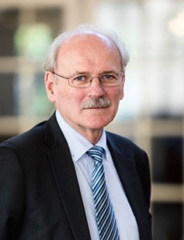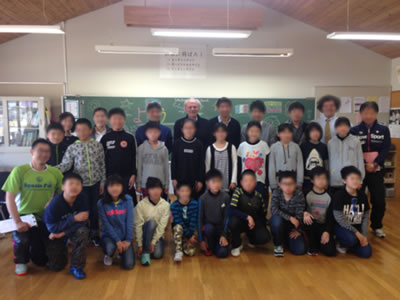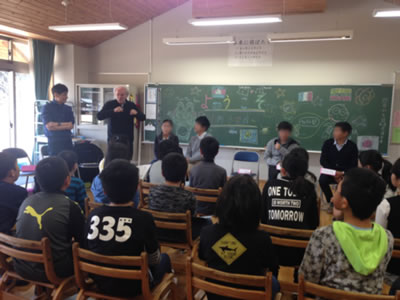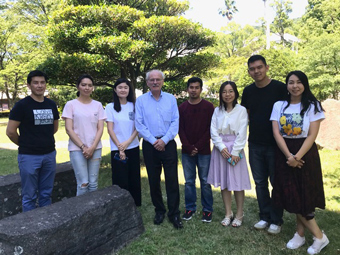
CONTENTS
Message
 |
|---|
Large nuclear accidents, like Chernobyl and Fukushima, introduce great complexity into society. The technical response mobilizes authorities and experts who are faced with many challenges to effectively control the risk of radiation during the emergency response and the recovery phase. This mobilization is largely based on past experience with nuclear disasters and appeals to all the scientific knowledge of radiation effects on humans and the environment. As far as the affected society is concerned, and particularly the people living in the contaminated areas, the accident results in the sudden outburst of the complexity of the environment in which individuals are used to evolve which is raising a lot of questions and concerns particularly concerning the risk of radiation to health. The irruption of radioactivity into everyday life also seriously affects the well being of directly affected people and the quality of the 'living together'. In such a context the objective is not only the protection of people against the potential health consequences of radiation, but also the maintenance of sustainable living conditions including respectable lifestyles and livelihoods.
The Chernobyl and Fukushima experience has shown that in order to overcome the numerous difficulties associated with the presence of radioactivity in the daily environment, it was essential to directly involve in the management of the situation the people who make the choice to remain in the affected territories. This implies for the authorities, experts and professionals, especially health professionals, to intervene on the ground to develop innovative social processes aiming at protecting people and restoring control on their daily life. Needless to mention that in such a complex context, the communication of authorities and experts is a major challenge in the management of the situation, but also a very difficult exercise given the widespread distrust among the public.
How to apply effectively the scientific knowledge, ethical values and principles of radiological protection to nuclear emergencies and post-accident situations?
How to involve affected stakeholders in their protection and the rehabilitation of their living conditions after a nuclear accident?
How to communicate about radiation risk in nuclear emergency and post- accident situations?
These are the questions to which the Department of Health Risk Control tries to provide elements of response taking into account the analysis of past and present experiences in intervention with public authorities and working with the population in areas affected by radioactivity. To support its approach, the Department adopts a trans-disciplinary approach combining the scientific bases of radiological protection with environmental and social sciences.
Professor Jacques Lochard
Profile
Specialty:
Radiological protection, Radiological risk assessment and management
Special Topics of Research:
- Methodologies for the implementation of the optimization principles in the design,
operation and dismantling of nuclear installations - Radiological protection of people living in contaminated territories after a nuclear accident
- Stakeholder involvement approaches in radiological protection
- Diffusion of the radiological protection culture
Education/Career:
- March 1974: Graduated, University Paris-Pantheon-Sorbonne, Paris,France
- September 1975 - August 1977: High school teacher of law and economics
- September 1977 – December 1982: Researcher at the Nuclear Protection Evaluation (CEPN)
- January 1983 to June 1986: Senior researcher at CEPN
- July 1986 to February 1989: Project leader at CEPN
- March 1989 to December 2016: Director of CEPN
- 2017
Professor at Nagasaki University
Visiting Professor at Hiroshima University
National and international professional responsibilities:
- President of the French Society of Radiation Protection - SFRP (1997-1999)
- Member of the radiological protection section of the High Council for Public Hygiene of France (1997-2002)
- Chairman of the Commission on long term recovery of the ‘Steering Committee for the Management of the Post-accident Phase of a Nuclear Accident’ - CODIRPA (2009-2012)
- President of the Franche-Comté CCSTI (2011 to present)
- Executive Officer of IRPA (2000-2012)
- Chairman of the CRPPH/NEA (2005-2009)
- Secretary of Committee 3 of the International Commission on Radiological Protection- ICRP (1994-1997)
- Member of Committee 4 of ICRP (1997-2009)
- President of Committee 4 and member of the Main Commission of ICRP (2009-2013)
- Member of the External Evaluation Committee of the Phœnix Leader Education Program (Hiroshima Initiative) for Renaissance from Radiation Disaster (2013-2016)
- Vice-Chair of the Main Commission of ICRP (2013-2021)
Professional Awards
- Professor Shinji Takahashi Memorial Lecture, Japan, 2014
- Thomas S. Tenforde Lecture, USA, 2015
Research projects
The implementation of protective actions in contaminated areas after a nuclear accident
The process of co-expertise in the rehabilitation of living conditions of people affected by a nuclear accident
Oral presentations
- The Human and Sociental Dimensions of the Fukushima Accident. Nordic Nuclear Safety: Research, Operations and Beyond -Joint NKS-R and NKS-B Seminar-
24-25 May 2022, Stockholm, Sweeden
- The experience from the Fukushima Dialogue (2011-2019). Meeting of the German Radiation Protection Commission on Fact-based Risk Communication in Social Discourse
5 October 2021, Hanover, Germany - The new ICRP Publication 146 on radiological protection of people and the environment in the event of a large nuclear accident.
March 16, 2021 (online) - Supporting societal and economic dynamic of recovery: lessons from Chernobyl and Fukushima.
ICRP International Conference on Recovery after Nuclear Accidents. Radiological Protection Lessons from Chernobyl and Fukushima and and Beyond. 1-4 December 2020. Online. - About the co-expertise process.
International Advanced Training Course on Stakeholder Engagement for Recovery after Nuclear Disasters, 13 – 17 October 2020, Kawauchi, Japan (Zoom meeting). - Risk communication and public understanding about radiation: some lessons from nuclear accidents.
64th Health Physics Society Annual Meeting, 7-11 July 2019, Orlando, Florida, USA - About the tolerability of radiological risk.
64th Health Physics Society Annual Meeting, 7-11 July 2019, Orlando, Florida, USA - Lessons Learned in Communication from the Fukushima Accident
American Nuclear Society & Health Physics Society Joint Topical Conference
30 September – 3 October, 2018, Tri-Cities, Washington, USA - The Ethics of Radiological Protection in the Context of Nuclear Accidents
4th Symposium on Ethics of Environmental Health University of South Bohemia 9-12 September 2018, Budweis, Czech Republic - Resilience and Nuclear Post-Accidental Situations: Lessons from Chernobyl and Fukushima
2nd International Symposium of the Network-type Joint Usage/Research Centre for Radiation Disaster Medical Science - For the Establishment of the Science of Resilience -
3-4 February 2018, Nagasaki, Japan - Post-Accident Situations and Social Innovation: Lessons from Chernobyl and Fukushima
3rd Symposium of the Phoenix Leader Education Program Industry-Academia-Government Consortium
1 September 2017, Tokyo, Japan - Practical Radiological Protection Culture: a Challenge for Professionals
Japan Health Physics Society Meeting 29 June 2017, Oita, Japan - My Experience with the Post-Accident Situations of Chernobyl and Fukushima
The 81st Seminar of Atomic Bomb Disease Institute
6 June 2017, Nagasaki, Japan
Publications
2023
-
Xiao, X.; Matsunaga, H.; Orita, M.; Kashiwazaki, Y.; Taira, Y.; Win, T.Z.; Lochard, J.; Schneider, T.; Takamura, N. Assessment of Radiation Risk Perception and Interest in Tritiated Water among Returnees to and Evacuees from Tomioka Town within 20 km of the Fukushima Daiichi Nuclear Power Plant. Int. J. Environ. Res. Public Health2023,20,2690. https://doi.org/10.3390/ijerph20032690.
-
Lochard J. Responding to disasters: about the governance of post-nuclear accident situations. Arch Psychiatr Ment Health. 2023; 7: 001-003. https://doi.org/10.29328/journal.apmh.1001045.
2022
- LOCHARD J. Lessons learned from the Chernobyl and Fukushima nuclear accidents. 98-99, 2022. Proceedings of the 2021 Fukushima Medical University International Symposium on the Fukushima Health Management Survey. Fukushima Medical University, 98-99, 2022.
- LECOMTE JF., LOCHARD J. SCHNEIDER T. Protection radiologique des personnes et de l’environnement en cas d’accident nucléaire majeur. Mise à jour des Publications 109 et 111 de la CIPR. Traduction française de la Publication 146 de la CIPR. Collection Lignes Directrices de l’IRSN, 2022.
- HU ZAR W, LOCHARD J, TAIRA Y, TAKAMURA N, ORITA M, MATSUNAGA H. Risk communication in the recovery phase after a nuclear accident: the contribution of the “co-expertise process”. Radioprotection 57(4): 281–288, 2022.
2021
- SCHNEIDER T., LOCHARD J., et al. Radiological protection challenges facing business activities affected by a nuclear accident: some lessons from the management of the accident at the Fukushima-Daiichi Nuclear Power Plant. Radioprotection 56(3):181-19,2021.
- CLEMENT C., RÜHM W., Harrison J., APPLEGATE K., COOL D., LARSSON C-M., COUSINS C., LOCHARD J., BOUFFLER S., CHO K., KAI M., LAURIER D., LIU S., ROMANOV S. Keeping the ICRP Recommendations Fit for Purpose. J. Radiol Prot (41):1390-1409, 2021. https://doi.org/10.1088/1361-6498/ac1611.
- Lochard J. The ethics of the co-expertise process in the post-nuclear accident context. In Rresearch Ethics for Environmental Health. Routledge, Chapter 7, 16 pages, 2021.
-
SCHNEIDER T., LOCHARD J. Supporting societal and economic dynamics of recovery: lessons from Chernobyl and Fukushima.
Ann ICRP 50(1 suppl): 68-73, 2021. https://doi.org/10.1177/01466453211006812.
2020
- LOCHARD J. Lessons learned in communication from the Fukushima accident. Proceedings of the Joint American Nuclear Society and Health Physics Society Conference: Applicability of Radiation-Response Models to Low-Dose Protection Standards 1–3 October 2018, Pasco, Washington. Brooks, A. L.; Glines, W. M.; Waltar, A. (Eds). Health Physics. 118(3):297-298, March 2020.
- LOCHARD J. The post-nuclear accident co-expertise experience of the Suetsugi community in Fukushima Prefecture, SFRP. 225-235, July, 2020.
- M. KAI M., HOMMA T., LOCHARD J. & al. - Radiological protection of people and the environment in the event of a large nuclear accident: update of ICRP Publications 109 and 111. ICRP Publication 146. Ann. ICRP 49(4).
2019
- LOCHARD J., SCHNEIDER T., ANDO R., NIWA O., CLEMENT C., LECOMTE J.F., TADA J.I. An overview of the dialogue meetings initiated by ICRP in Japan after the Fukushima accident. Radioprotection 2019, 54(2), 87–101
https://www.radioprotection.org/articles/radiopro/full_html/
2019/02/radiopro190031/radiopro190031.html - SCHNEIDER T, MAÎTRE M, LOCHARD J, et al.
The role of radiological protection experts in stakeholder involvement in the recovery phase of post-nuclear accident situations: Some lessons from the Fukushima-Daïchi NPP accident. Radioprotection 2019, 54(4), 259–270
https://www.radioprotection.org/articles/radiopro/full_html/
2019/04/radiopro190069/radiopro190069.html
2017
- CLEMENT C., LOCHARD, J. Reflections on the Ethical Basis of the System of Radiological Protection. In: Ethics of Environmental Health (Routledge Studies in Environment and Health). Zölzer F. and Meskens, G. Eds. Oxford (Routledge), 2017, pp. (ISBN-10 1138186627).
- LOCHARD J. Social trust, Confidence, and Cooperation in Post-Nuclear Accident Situations. Proceedings of the 6th International Symposium on Phœnix Leader Education Program for Renaissance from Radiation Disaster, Hiroshima, Japan, 11-12 February 2017. To be published
2016
- LOCHARD J. - The Ethics of Radiological Protection. First Thomas S. Tenforde Topical Lecture, 51st NCRP Annual Meeting, Bethesda, MA, USA, 17 March 2015. Health Physics 110 (2) 201-210, 2016.
- LOCHARD J. & al. - Radiological Protection from Cosmic Radiation in Aviation.
ICRP Publication 132. Ann. ICRP 45(1), 2016, pp. 1–48. - SCHNEIDER T., LOCHARD J. et al. - The Involvement of Experts in Post-Accident Management at the Service of Population: Lessons from the Fukushima Accident.
Proceedings of the NERIS Workshop, 27-29 April 2015, ISBN 978-2-9552982-0-6, 2016. - SCHNEIDER T., LOCHARD J., VAILLANT L. - Focal Role of Tolerability and Reasonableness in the Radiological Protection System. Ann. ICRP 45(1S), 2016, pp. 309-321.
- LOCHARD J., SCHNEIDER T., CHARRON S., GARIEL J.C., ROLLINGER F. – Réhabilitation des conditions de vie après l’accident nucléaire de Fukushima. Contrôle N°201, Décembre 2016.
- TANIGAWA K., LOCHARD J., ABDEL-WAHAB M., CRICK M,. – Roles and Activities of International Organizations After the Fukushima Accident. Asia Pacific Journal of Public Health, 2017, Vol. 29(2S) pp. 90S-98S. 2016 .
- HASEGAWA S., OKU S.,FUJISE D., YOSIDA Y., SCHNEIDER T., LOCHARD J. & al. – A Study of a Development of Internal Exposure Management Tool Suited for Japanese Diet Behavior. T. Takahashi (ed), Radiological Issue for Fukushima’s Revitalized, 2016, Chapter 20, pp.221-232.
- ROLLINGER F, LOCHARD J., SCHNEIDER T. Lessons learnt by IRSN about the involvement of experts towards the population in contaminated areas in Fukushima Prefecture. Proceedings of the International Workshop on the Fukushima Dialogue Initiative - Rehabilitation of Living Conditions after the Nuclear Accident. Date City Silk Hall, Fukushima Prefecture, Japan 12-13 December 2015. Annals of the ICRP, Vol 45 N° 2S, 2016, pp. 99-104.
- LOCHARD J. The recommendations of the ICRP Publication 111 in the light of the ICRP Dialogue Initiative in Fukushima. Proceedings of the International Workshop on the Fukushima Dialogue Initiative - Rehabilitation of Living Conditions after the Nuclear Accident. Date City Silk Hall, Fukushima Prefecture, Japan 12-13 December 2015. Annals of the ICRP, Vol 45 N° 2S, 2016, pp. 110-118.
- LOCHARD J. The genesis of the ICRP Dialogue Initiative . Guest editorial. Proceedings of the International Workshop on the Fukushima Dialogue Initiative - Rehabilitation of Living Conditions after the Nuclear Accident. Date City Silk Hall, Fukushima Prefecture, Japan 12-13 December 2015. Annals of the ICRP, Vol 45 N° 2S, 2016, pp. 7-13.
Links

 Kawauchi village, Fukushima
Kawauchi village, Fukushima

